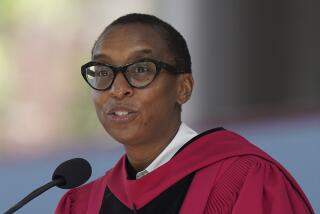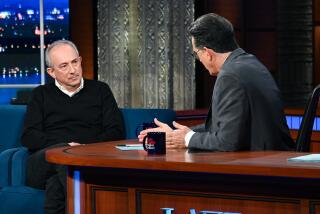Publishing, Pressure, Profits and Plagiarism
- Share via
Plagiarism is one of those petty larcenies many of us were more or less guilty of in high school or college or both.
Still, we knew the gravity of the offense and paid for it accordingly. It was drummed into us as the cardinal sin.
Maybe that’s why we shudder and gasp when we discover that some of the revered and widely read historical texts of our day have themselves been cribbed from somewhere else.
In January, journalist Fred Barnes excoriated beloved popular historian Stephen Ambrose for using unattributed passages from Thomas Childers’ book “The Wings of Morning” in his best-selling “The Wild Blue.”
A few days later, Ambrose admitted and apologized for copying sentences and phrases from Childers’ book but maintained that he had done so inadvertently. Thereafter, the scandal mushroomed when footnote chasers found plagiarized passages in other books by Ambrose.
A similar scandal has arisen around historian Doris Kearns Goodwin, whose books--including the best-selling “No Ordinary Time,” about FDR’s presidency--catapulted her into a television career. She had been appearing regularly as a commentator on shows like “The News Hour With Jim Lehrer” and “NBC Nightly News.”
But now Goodwin is faced with accusations of having copied passages from at least three other books in her 1987 “The Fitzgeralds and the Kennedys.” Last week, she admitted using a good deal of unattributed material.
If you count the case of another best-selling, Pulitzer Prize-winning historian--Joseph J. Ellis (“Founding Brothers: The Revolutionary Generation”)--who was caught last year lying to his Mount Holyoke students about serving in Vietnam, you have what amounts to a startling rash of mendacity in popular history and a serious betrayal of public trust, not to mention an egregious breach of intellectual copyright.
What’s going on?
Though this doesn’t explain Ellis’ lapse, the NASCAR pace of modern publishing may be a large part of what led Ambrose and Goodwin to fudge.
In the past two decades, almost all of the venerable old small publishing houses have been absorbed by multimedia conglomerates like Viacom and AOL Time Warner, which demand profitability.
This means more bestsellers, since these often are the only books that make an appreciable profit.
It also means that once a publisher hits on a best-selling author, the publisher wants to keep that author producing as fast as possible. It’s what pays the bills.
And therein lies the reason for the kind of rushing and resultant sloppiness that both Goodwin and Ambrose have blamed for their oversights.
There is some truth to the claim that trade publishing has become a harried, assembly-line operation with its head on the block. Only serial blockbusters can stay the ax man’s hand.
Thus many books have become as formulaic and shoddy as the flicks that Hollywood churns out. Publishers and writers are desperate to cash in on the latest craze, be it baseball, the founding fathers or jihad. Their livelihoods depend on it.
This may be one of the real tragedies of free market capitalism gone awry. The quality of our intellectual life is declining in the throes of profit and loss, and the proof is in the process.
We should be saddened when the first and often only question a publisher asks when he reads a manuscript is: Will it sell?
Of course, none of this absolves Doris Kearns Goodwin or Stephen Ambrose. But if their borrowing was indeed just hurried mistakes in the factories that their studies have become, it’s not hard to see how it could have happened.
More to Read
Sign up for our Book Club newsletter
Get the latest news, events and more from the Los Angeles Times Book Club, and help us get L.A. reading and talking.
You may occasionally receive promotional content from the Los Angeles Times.






